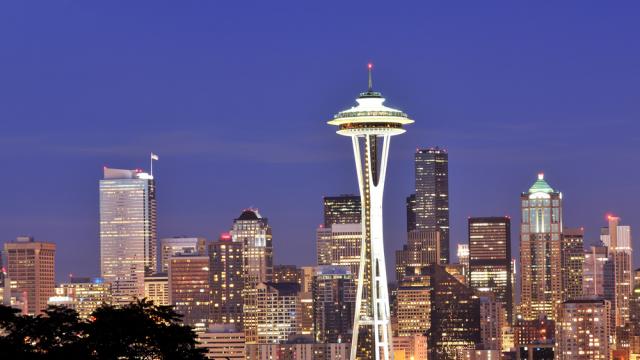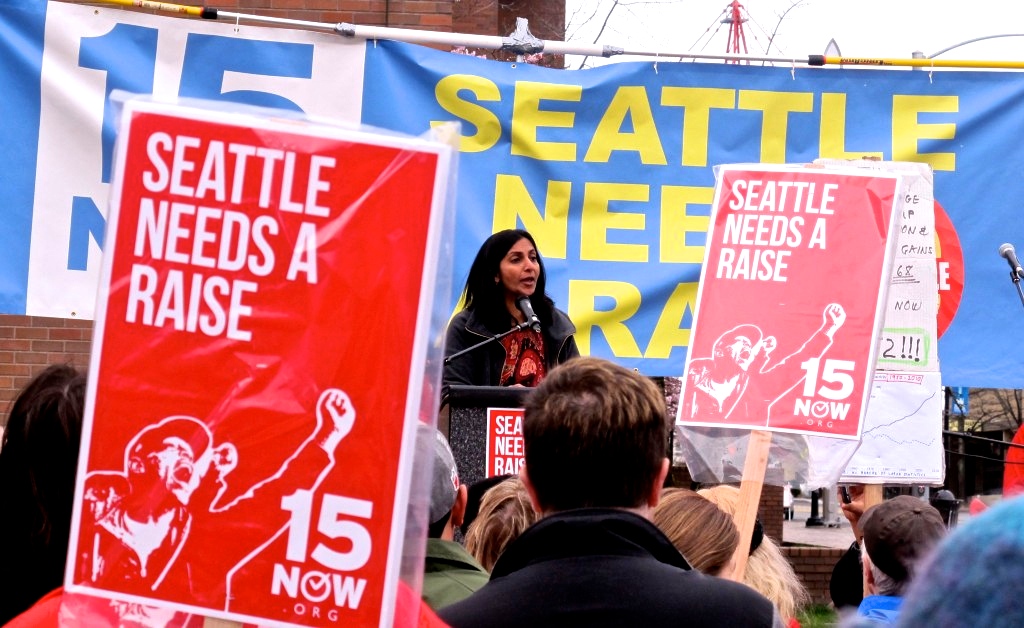
Seattle city council has unanimously voted to impose the highest minimum wage in the U.S. at $15 an hour in a “historic victory” for the widening movement to lift low paid workers out of poverty.
The incremental increase over several years will benefit about one quarter of Seattle’s workforce, particularly women and minorities, as it raises the lowest pay to more than double the federal minimum wage.
The vote is expected to give momentum to campaigns across the U.S., from San Francisco and Chicago to New York state, to raise the incomes of minimum wage workers after Republicans in Congress blocked President Obama’s proposal for a national increase.
But Seattle’s law will be closely watched for its economic impact and for threatened legal action by local franchises of fast food corporations, such as McDonald’s and Subway, some of the largest employers of low paid workers in the city, which are seeking to be classified as small businesses in order to win more years to implement the increases.
Kshama Sawant, the only socialist city councilor in the U.S., whose election campaign last year became a driving force behind the minimum wage legislation in Seattle, hailed the vote at a boisterous meeting before a packed council chamber as a “historic victory” for working people.
“A hundred thousand low-wage workers in Seattle will be seeing their wages raised to $15 an hour over the next 10 years. That would imply a transfer of roughly $3 billion from the top to the lowest paid workers. Such a transfer has not happened in so many decades because mostly what’s happened is the flow of wealth has been from the bottom up. This is really raising the confidence of working people around the country,” she said.
Before the vote, councilors heard from workers who will benefit from the raise, including Hanna Martenson who works at the discount retailer Target for $9.61 an hour, a little above the Washington state minimum wage.
“I work very very hard for it. What $15 [an hour] means is that workers like me are able to afford basic necessities. Rising housing costs are certainly part of the problem. Things like health care, things like being able to afford new shoes before our shoes fall apart, being able to go to the dentist if we get a cavity without worrying about it completely destroying our lives,” she said.
“I would really like to be able to save money for retirement or if something happens to me so I don’t end up on the street.”
Trade unions also backed the new law, including the local branch of the AFL-CIO. "This ordinance not only will lift many, many workers out of poverty, it tells the business establishment in no uncertain terms that the game is changing, that working people are tired of watching the 1% get richer while the rest of us get poorer," it said.
Seattle will phase in the new minimum wage from April 1, 2015, over several years with large companies on a faster track than small businesses and non-profit groups. Big corporations, which employ about two thirds of Seattle workers presently earning less than $15 an hour, will be required to raise pay in increments over three years with further increases for inflation.
Smaller businesses of up to 500 workers will have seven to 10 years to implement the increases depending on benefits such as health care.
A University of Washington study commissioned by the council said the increase would benefit 100,000 people working in the city, reduce poverty by more than one quarter and save the government money by reducing the number of people claiming food stamps and other welfare payments. The pay of full-time workers on the existing minimum wage would increase by about $11,000 a year.
Opposition to the increase in Seattle has centerd on claims that it will drive enterprises with slender profit margins out of business and force restaurants, which employ the largest number of minimum wage workers in the city, to lay off people.
But studies of significant minimum wage increases in San Francisco, Santa Fe and San Jose show no evidence of job losses. Michael Reich, director of the Institute for Research on Labor and Employment at the University of California, Berkeley, assessed the impact of minimum wage increases in San Francisco where combined pay and required healthcare benefits now amount to $13.15 an hour.
Reich said restaurant prices in San Francisco rose by only a fraction as a result of increased pay.
“Increased minimum wage has a big impact on people who work in these restaurants – they’re going to have a much higher income – and a very small effect on people who go to the restaurant, the consumers,” he said.
Reich said business with a high turnover of staff because of low wages, such as fast food restaurants, benefit from the increase in the long run in part because it helps create a more stable workforce.
A study for the Puget Sound Sage, a coalition of labor, civic and religious organizations in Seattle, said the increased minimum wage will inject more than $500 million into low-wage households that will circle back into the local economy instead of being siphoned off into the pockets of distant wealthy shareholders.
“A major effect of raising pay checks for earners at the bottom of the wage scale is that these earners are likely to spend more of their income on local goods and service than higher-income earners. In turn, these households will increase patronage of area businesses, giving a boost to their community’s overall prosperity,” the report said.
Reich was more cautious, saying that while some of the money would be spent in Seattle’s businesses, many workers lived outside of the city because of more affordable housing and were likely to spend a good proportion of their increased pay in their own neighborhoods.
A minority of councilors failed to block concessions to business interests including the three-year phase-in for big corporations and a lower “training wage” for the young and handicapped people. Some in the council chamber shouted “shame” when the measures were included in the legislation but the new law is likely to prove enough to head off a threatened ballot initiative to force a more rapid increase to $15 an hour and strip away caveats.
Sawant and activists with 15 Now, a group she helped found earlier this year to press for minimum-wage increases in several U.S. cities, have targeted McDonald’s and other corporations which make large profits on the back of low pay. But owners of some fast-food restaurants in Seattle are threatening legal action on the grounds they are franchises and should be treated as small businesses, allowing them the longer phase-in.
Matthew Hollek, owner of a Subway sandwich store, told a council hearing he owns a single outlet and should not be treated the same as a corporation. “I’m not McDonald's. I’m not a wealthy franchiser. I’m not Subway. I pay them for the use of the name. That’s it,” he said.
Jerrod Sessler, the CEO of Seattle-based franchising company HomeTask, accused the council of putting businesses “in front of a firing squad.”
Lawyers for the owners of several fast-food outlets say they will sue the city. Sawant said she was not surprised by the threats.
“Really the forces arrayed against us are big business and their lobbyists. They are not going to give in lightly because they know what it means. They are going to do whatever is in their power to stop it,” she said.
That is likely to prove increasingly difficult.
In this year’s state of the union speech, Obama expressed frustration with opposition in Congress to his proposal to raise the federal minimum wage to $10.10 an hour. He called on local legislatures to take up the issue.
"To every mayor, governor and state legislator in America, I say: 'You don’t have to wait for Congress to act'," the president said. "Americans will support you if you take this on."
Reich said there is growing popular pressure on city and state legislatures to do just that.
“A lot of this is because there have been direct protests and the polls show there’s a huge amount of support for raising the minimum wage. It’s spreading. The more cities and states do this the more you have the demonstration effect,” he said.
The California Senate last week passed a bill pushing the state’s minimum wage to $13 an hour by 2017, overriding a slower increase signed only last year by Governor Jerry Brown.
In Chicago, nearly half of the city council has signed on to a bill to raise the minimum wage to $15 an hour tied to inflation. Their proposal would see a more rapid introduction than in Seattle with larger firms required to introduce it within a year. The move comes after more than a year of campaigning by Raise Chicago, a coalition of trade unions and civic groups.
New York City’s mayor, Bill de Blasio, has said he wants to raise the city’s minimum wage but Governor Andrew Cuomo has insisted it is a state issue.
However, under growing public and political pressure with Democratic legislators pushing a bill for $15 an hour, Cuomo at the weekend said he has his own plans to raise the New York state minimum to Obama’s recommended $10.10 an hour and to allow local jurisdictions flexibility to add another 30% – meaning de Blasio could push his city’s lowest wages up to more than $13 an hour.
3 WAYS TO SHOW YOUR SUPPORT
- Log in to post comments












